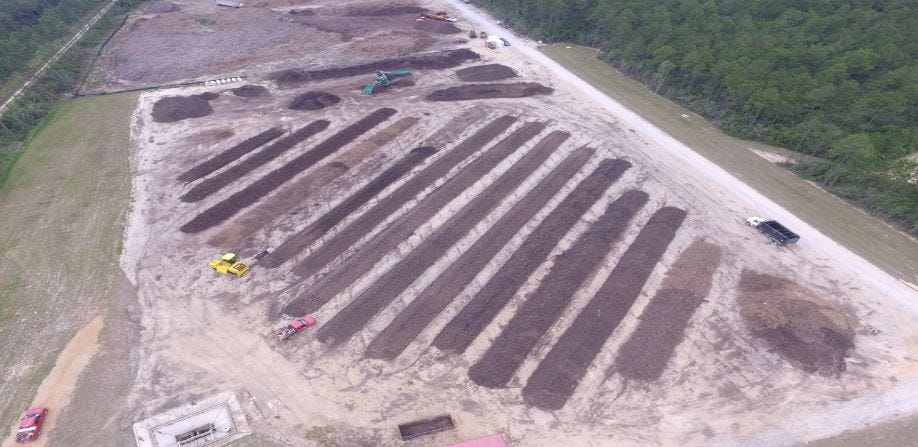![Emerald Coast Utilities Authority's composting facility is located on 20 acres at the Central Water Reclamation Plant in Cantonment. [Special to the Press Gazette]](http://127.0.0.1/wordpress/wp-content/uploads/2022/01/ghows-DA-4d499a7a-0849-2d0c-e053-0100007f2a3f-665145e3.jpeg)
MILTON — Emerald Coast Utilities Authority offers many services to Northwest Florida and parts of lower Alabama. These include sanitation and recycling, water treatment and, most recently, composting and a product called Bloom.
SAVING MONEY, PROTECTING WATERS
The facility annually produces about 15,000 tons of Bloom, in the form of mulch, fine compost and standard compost.
Biosolids from ECUA’s Central Water Reclamation Plant, commercial yard waste and residential waste are used to produce Bloom. The compost contains nutrients such as nitrogen, phosphorus, potassium, calcium, magnesium, copper, iron, zinc, sulfate and others.
So, how does it all happen?
Well, ECUA uses a compost method called the Modified Static Aerobic Pile process, during which standard compost, used for most needs, passes through a five-eighths-inch screen. Fine compost, used for topdressing on lawns and turf grass, passes through a quarter-inch screen.
During the composting process, high temperatures kill bad bacteria in the biosolids, making the compost safe to use. Bloom has an earthy smell similar to soil or mulch, according to an ECUA spokesperson.
According to Jim Roberts, ECUA’s public information officer, the MSAP process requires fewer turnings as opposed to traditional composting, which saves cost on labor, fuel and equipment maintenance.
Also, the faster composting speed means more material can be composted in a smaller space.
As for the benefit?
“[Bloom] can reduce or eliminate the need for chemical fertilizers, potentially saving money and protecting our waters,” an ECUA spokesperson said. “Plus, you help us keep yard waste out of the landfill.”
‘I GIVE IT A THUMBS-UP’
ECUA began composting operations just over a year ago, and many local farmers, landscapers and gardeners now use the product.
“I have used quite a bit of it in the last six months,” Todd Wells of Contemporary Landscapes in Pace said. “It’s very good-quality stuff; it’s great, organic-based, which is really good for our soil because we don’t have much organic [material] in the soil naturally.
“I give it a thumbs-up. I haven’t had any problems with it, and I would highly recommend it.”
He’s not the only one praising the product. Bloom won the Solid Waste Association of North America’s 2016 Gold Compost Award.
Before Bloom could be sold to consumers, the U.S. Composting Council’s Seal of Testing Assurance Program put the compost through various physical, chemical and biological tests to help the producer and consumer determine if the compost is suitable for its intended use.
The company offers a trial to consumers who want to test the compost at a discounted rate. Bloom is normally sold by the cubic yard and the price is based on volume purchased.
ECUA launched a mid-2015 campaign encouraging residents to put their yard waste in large, recyclable brown paper bags, instead of plastic bags, due to their ability to be composted.




This article originally appeared on Santa Rosa Press Gazette: Bloom: a cost-efficient fertilizer alternative
